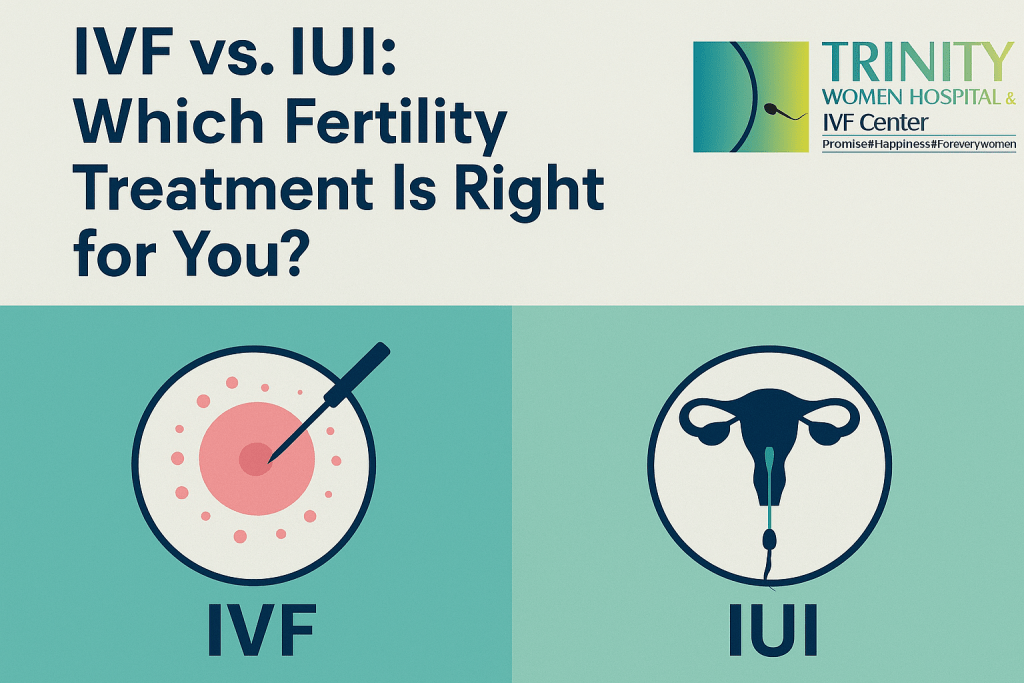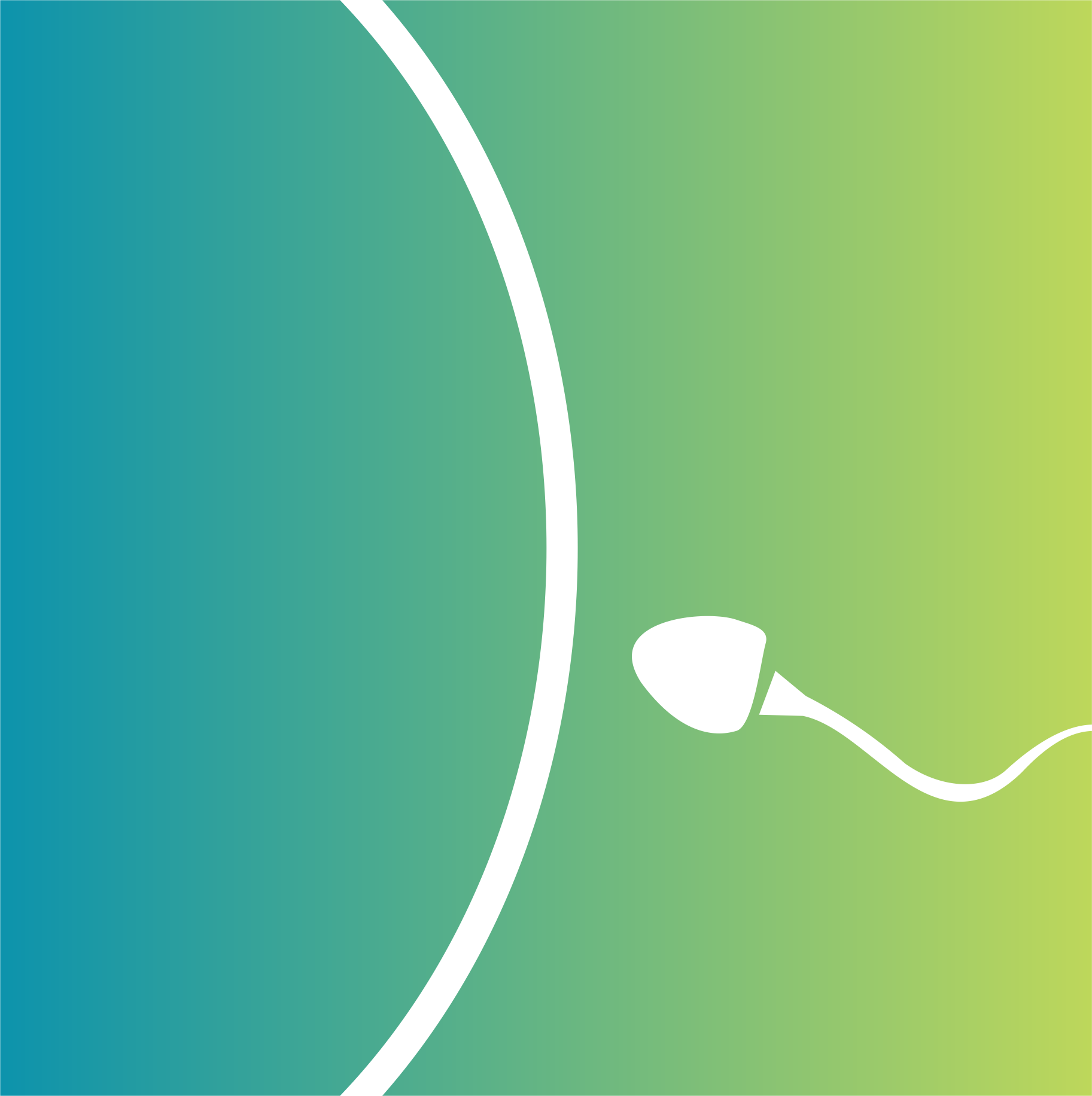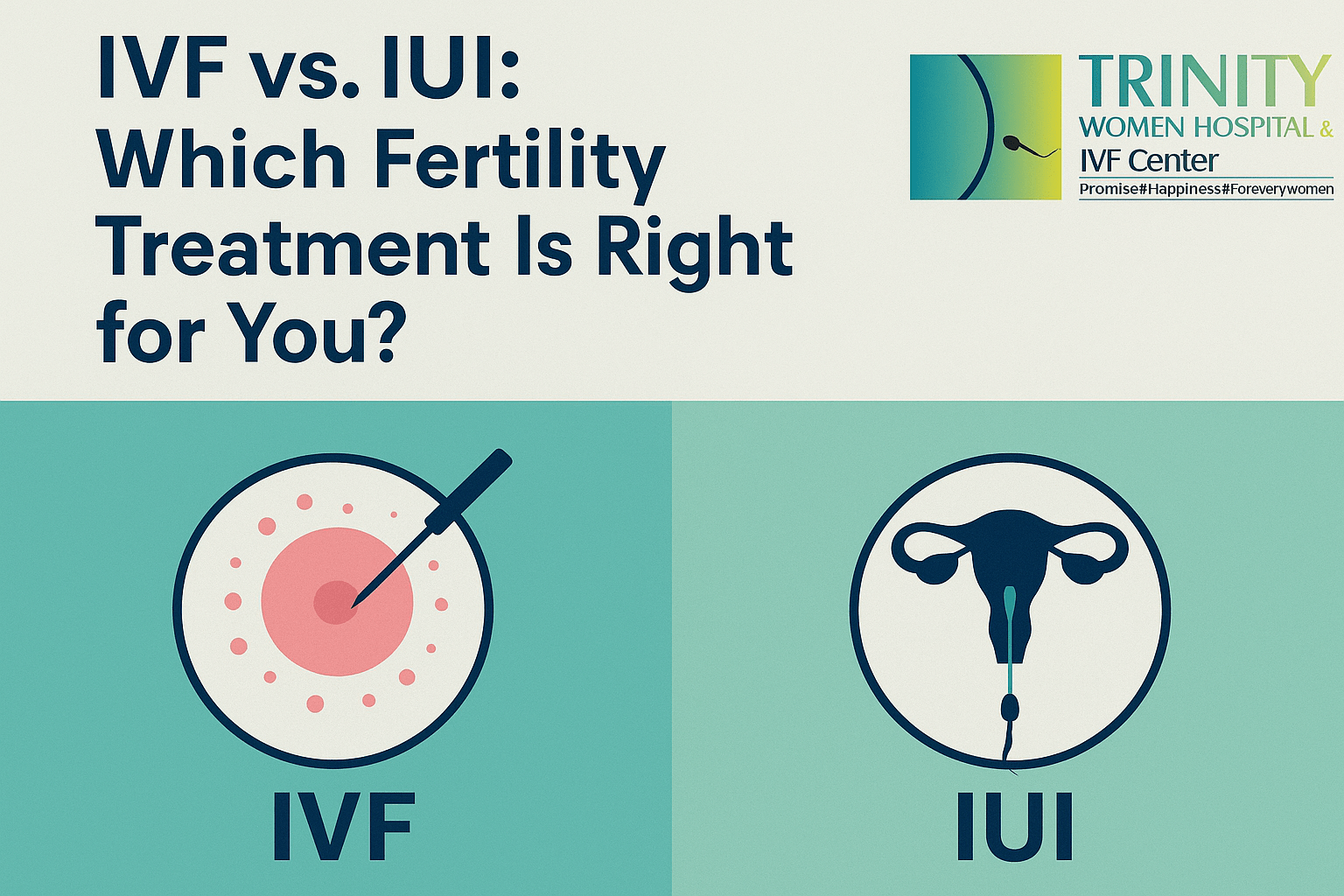Introduction : IUI vs. IVF
When couples face challenges in conceiving naturally, two of the most common options recommended by fertility specialists are IUI (Intrauterine Insemination) and IVF (In Vitro Fertilization). Both treatments are designed to assist with conception, but they differ significantly in procedure, cost, success rate, and suitability.
In this blog, we’ll help you understand the difference between IVF and IUI, and guide you on choosing the right path based on your medical condition and fertility goals.

🧬 Understanding IVF and IUI
IUI (Intrauterine Insemination) is a relatively simple procedure where washed and concentrated sperm is placed directly into the uterus around the time of ovulation. This helps the sperm get closer to the egg, increasing the chances of fertilization.
IVF (In Vitro Fertilization) is a more advanced procedure where eggs are retrieved from the ovaries and fertilized with sperm in a lab. The resulting embryo is then transferred to the uterus.
Both techniques have helped millions of couples achieve their dream of parenthood, but they cater to different fertility issues.
⚖️ IVF vs. IUI: Key Differences
| Factor | IUI | IVF |
| Procedure | Sperm inserted into uterus | Eggs fertilized outside body, embryo implanted |
| Invasiveness | Minimally invasive | Involves egg retrieval, lab fertilization |
| Cost | Lower (₹8,000–₹25,000 per cycle) | Higher (₹1.5–₹2.5 lakh per cycle) |
| Success Rate | 10–20% per cycle (age dependent) | 40–60% per cycle (age & case dependent) |
| Time Involved | Shorter cycle (2–3 weeks) | Longer cycle (4–6 weeks) |
| Medications | Mild stimulation may be used | Requires hormonal injections |
👩⚕️ Who Should Consider IUI?
IUI is generally recommended for couples with:
- Unexplained infertility
- Mild male factor infertility (low motility or count)
- Cervical mucus issues
- Single women or same-sex couples using donor sperm
- Couples where intercourse is not possible due to medical reasons
It is often the first step in fertility treatment due to its affordability and simplicity.
🧪 Who is a Better Fit for IVF?
IVF is a more appropriate option for couples dealing with:
- Blocked or damaged fallopian tubes
- Advanced maternal age (35+)
- Severe male infertility
- Endometriosis or PCOS
- Multiple failed IUI cycles
- Genetic conditions (when PGT testing is needed)
IVF offers more control and higher success rates, especially when combined with procedures like ICSI or embryo freezing.
👨⚕️ Doctor’s Advice & Real-Life Insights
At Trinity Women Hospital, we understand that every fertility journey is unique, and that’s why our team takes a personalized and in-depth approach to diagnosis and treatment. Our fertility specialists begin by conducting thorough evaluations for both partners. This includes detailed hormone testing, pelvic ultrasounds, semen analysis, lifestyle assessments, and a full review of medical history. These steps help us find the root cause of infertility and build the right treatment plan for each couple.
In many cases, especially when infertility is mild or unexplained and the woman is below 35, we may begin with IUI (Intrauterine Insemination), which is less invasive and more affordable. However, when the issue is more complex — like blocked fallopian tubes, low sperm count, PCOS, or long-standing infertility — we recommend IVF (In Vitro Fertilization) as it offers a higher success rate and better control over the process. At Trinity Women Hospital, we combine compassionate care with advanced technology to support you at every step of your parenthood journey.
Example 1: A 29-year-old woman with unexplained infertility conceived after two IUI attempts.
Example 2: A 38-year-old couple with poor sperm motility saw success with IVF and ICSI after three failed IUI cycles.
Each journey is unique—and the right treatment depends on your body, diagnosis, and emotional readiness.
✅ FAQ
1. What is the main difference between IVF and IUI?
The main difference is how fertilization occurs. In IUI (Intrauterine Insemination), sperm is directly placed into the uterus. In IVF (In Vitro Fertilization), eggs and sperm are combined outside the body in a lab and then the embryo is transferred into the uterus.
2. Which is more successful: IVF or IUI?
IVF generally has higher success rates than IUI, especially for couples with fertility challenges like blocked fallopian tubes, low sperm count, or advanced age. However, success depends on individual health factors.
3. Is IUI less expensive than IVF?
Yes, IUI is usually much more affordable than IVF. It requires fewer medications and procedures, making it a good starting option for many couples with unexplained infertility.
4. How many IUI attempts should be tried before IVF?
Most fertility experts suggest 3 to 6 IUI cycles before moving to IVF, depending on age, diagnosis, and response to treatment.
5. Are there any side effects or risks with IVF or IUI?
Yes, both treatments have potential side effects like:
- IUI: Mild cramping, spotting
- IVF: Bloating, mood swings, ovarian hyperstimulation syndrome (OHSS), multiple pregnancies
🧭 Conclusion: Choosing the Right Path
Both IUI and IVF have their place in modern fertility care. While IUI is less invasive and more affordable, IVF offers higher chances of success, especially for complex cases. The best way to decide? Talk to a fertility specialist who can guide you through options based on clinical evaluation and your personal goals.
At Trinity Women Hospital, we offer personalized fertility solutions with compassion, transparency, and world-class technology.
📞 Ready to start your journey to parenthood?
Contact us today for a consultation and take the first step towards building your family.

